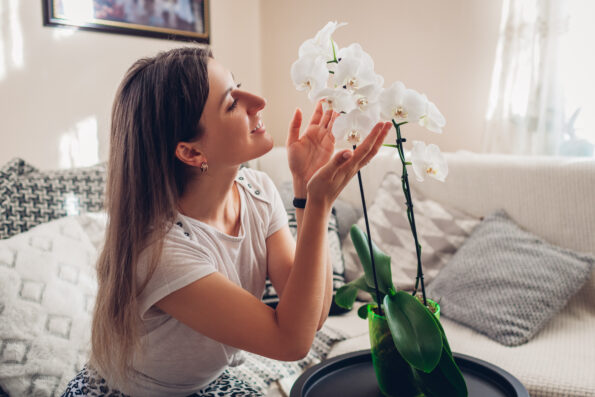Has Anyone Gifted You An Orchid? Let’s Talk About How You Can Properly Care For One, So It’s Not Just Done After A Few Months Of Being In Your Home

No one can deny the magnificent beauty of the orchid. Their delicate stems, various color options, and tropical nature make them a favorite among plant lovers.
Orchids are one of the most popular flowers to give as gifts because of their long-lasting blooms. To be more specific, it’s moth orchids that are frequently sought after.
Moth orchids are the type that are most commonly sold in the marketplace. The moth orchid is fragrant, with wide, spectacular petals that often resemble the wings of a butterfly.
Many people toss the orchids they have been gifted after a while when they seem to stop producing blooms. But are you aware of how long orchids really last?
They’re not just done after a few months. There are ways you can make them keep coming back year after year. Here’s what you need to know about caring for orchids in your home.
Light
Orchids require bright, indirect light. The plant should never be sitting in direct sunlight; otherwise, it will get burned. In the winter, don’t let your orchid touch the cold windowpanes; the leaves might freeze.
Water
The death of an orchid is typically caused by overwatering. To water the plant properly, keep pouring until the water runs through the draining holes in the bottom of the pot. Then, dump out any extra water floating in the pot because orchids don’t like to soak. Water again when the potting mixture feels dry.

maryviolet – stock.adobe.com – illustrative purposes only, not the actual person
Soil & Fertilizer
Orchids are not planted in regular potting soil. They are usually sold in a potting mix of sphagnum moss or bark. Fertilize your orchid regularly for the best results. Use a balanced fertilizer geared toward orchids twice per month during the growing season, which ranges from mid-spring to early autumn.
Repotting
Orchids usually come in a pot that is already suitable for their needs, so you can leave them there for years. If you need to repot them, only do so every two to three years, like when you notice the potting mix beginning to break down. Just know that repotting your orchid may cause the blooming cycle to be pushed back for as long as a year.
Ailments
When growing an orchid for a long period of time, you are bound to come across a few problems. One issue is root rot, which is caused by overwatering. Orchids suffering from overwatering will likely have brown, mushy roots. For the opposite problem, underwatering, roots will be gray and shriveled.
Healthy roots are supposed to look plump and green. If you see your orchid suffering from root rot, trim away the browned roots and repot it in loose bark. If the plant is too dry, simply give it a long drink of water.
If true crime defines your free time, this is for you: join Chip Chick’s True Crime Tribe
Everything You Need To Know About Pink Lemonade Blueberries
Sign up for Chip Chick’s newsletter and get stories like this delivered to your inbox.
More About:Gardening